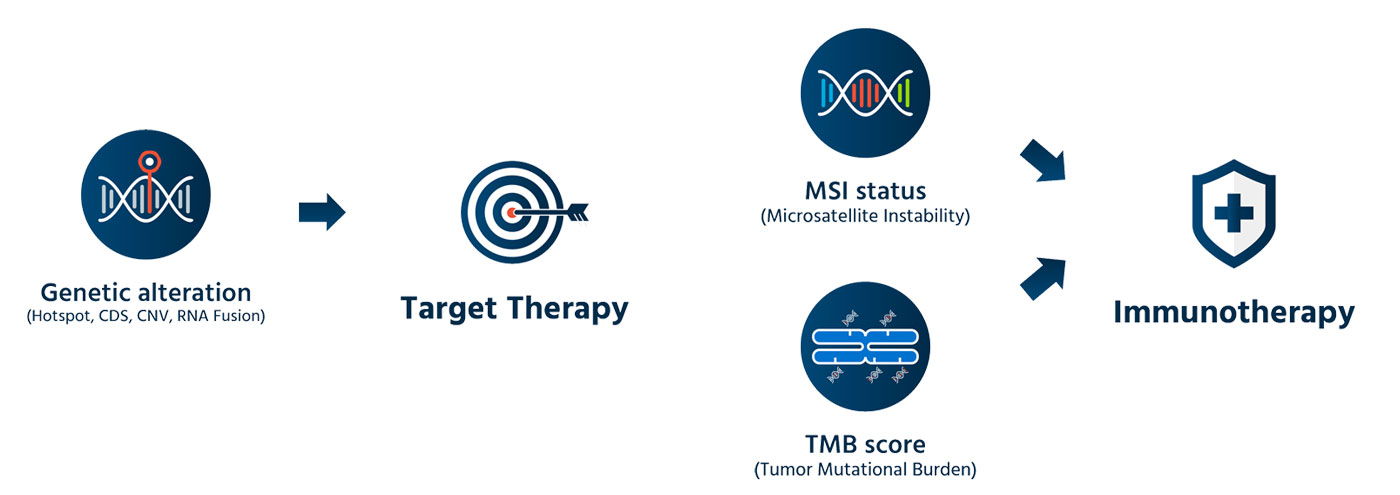Solid Tumor Panel
GCG Solid Tumor Panel enables a more precise and targeted approach to patient care, ultimately improving treatment outcomes and patient survival rates.

What is the Solid Tumor Panel?
The solid tumor panel is a specialized genetic test that analyzes the genetic alterations present in various types of solid tumors, such as lung, breast, colon, and many others. This comprehensive test examines specific genes or genetic regions that are frequently mutated or altered in these types of cancers.
By utilizing advanced technologies like next-generation sequencing (NGS), the solid tumor panel provides a detailed understanding of the genetic makeup of the tumor cells, enabling healthcare providers to make informed treatment decisions and improve patient management.

The Necessity of the GCG Solid Tumor Panel
- Comprehensive Genetic Analysis:
The solid tumor panel allows for a comprehensive genetic analysis of solid tumors, identifying specific mutations or alterations driving tumor growth. This information is vital for accurate diagnosis, prognosis, and treatment planning.- Genetic Alteration: The panel examines genetic alterations such as hotspot mutations, alterations in coding sequences (CDS), copy number variations (CNV), and RNA fusions.
- Tumor Mutational Burden (TMB): TMB measures the total number of mutations in a tumor. High TMB indicates a higher likelihood of response to immune checkpoint inhibitors, enhancing treatment options.
- Microsatellite Instability (MSI): MSI detects instability in short repetitive DNA sequences and identifies tumors that may respond well to immune checkpoint inhibitors.
- Personalized Treatment Options:
By uncovering genetic mutations or alterations in the tumor, the solid tumor panel helps identify personalized treatment options. Targeted therapies or immunotherapies can be selected based on specific genetic variations, increasing the chances of a favorable treatment response. - Prognostic and Predictive Information:
The panel results provide essential prognostic and predictive information. They help estimate tumor aggressiveness, predict disease progression, and determine the potential response to different treatment modalities. This information assists in developing personalized treatment plans and monitoring treatment response.
![[GBU]홈페이지-리뉴얼_콘텐츠-이미지6-54](https://gc-genome.com/wp-content/uploads/2023/07/GBU홈페이지-리뉴얼_콘텐츠-이미지6-54.png)
![[GBU]홈페이지-리뉴얼_콘텐츠-이미지6-58](https://gc-genome.com/wp-content/uploads/2023/07/GBU홈페이지-리뉴얼_콘텐츠-이미지6-58.png)
Benefits of the Solid Tumor Panel
- Precision Treatment: The panel results guide healthcare providers in selecting treatments tailored to the specific genetic alterations found in the tumor, maximizing treatment effectiveness.
- Prognostic Information: The panel helps predict disease progression and provides valuable insights into the patient’s potential response to various treatment options.
How is the Test Performed?
The solid tumor panel requires a small tissue sample obtained through a biopsy or surgical procedure. This sample is then analyzed using advanced technologies like next-generation sequencing (NGS) to identify specific genetic alterations unique to the tumor.
The solid tumor panel plays a crucial role in personalized cancer care, offering valuable insights into the genetic characteristics of the tumor. By analyzing TMB and MSI status, the panel helps identify personalized treatment options and opens doors to innovative therapies. Consult with your healthcare provider to learn more about how the solid tumor panel can guide personalized cancer care, bringing hope for improved outcomes on the cancer journey.
In the pursuit of delivering precise and tailored care to cancer patients, the solid tumor panel has emerged as an indispensable tool in the realm of oncology. This comprehensive genetic test enables healthcare providers to unravel the intricate genetic landscape of solid tumors, empowering them to make informed treatment decisions. In this article, we will explore the significance of the solid tumor panel and highlight the role of two crucial genetic markers it assesses: TMB (Tumor Mutational Burden) and MSI (Microsatellite Instability).
Comprehensive Genomic Profiling for Cancer Driver Mutations
GC Genome’s Solid Tumor Panel is an advanced Solid Tumor Panel Test designed to detect cancer driver mutations and provide crucial guidance for targeted therapy and immunotherapy selection. With coverage of 400+ genes, this newly upgraded test offers comprehensive genomic profiling to support informed treatment decisions for patients with solid tumors.
Accurate Identification of TMB Scores and MSI Status

One of the key features of GCG Solid Tumor Panel is its ability to simultaneously provide TMB scores and MSI status. TMB (Tumor Mutational Burden) evaluation helps assess the total number of genetic mutations within the tumor, offering insights into potential response to immunotherapies. MSI (Microsatellite Instability) status analysis identifies tumors with defective DNA repair mechanisms, making them more likely to respond to immune checkpoint inhibitors. This comprehensive profiling empowers clinicians and patients with critical information for personalized treatment strategies.
Optimizing Treatment Selection for Improved Outcomes
By utilizing GCG Solid Tumor Panel, healthcare providers can optimize treatment selection and improve patient outcomes. Identifying cancer driver mutations and understanding TMB scores and MSI status are key in tailoring therapy options, avoiding ineffective treatments, and reducing financial burdens associated with expensive therapies. This precise and targeted approach enhances treatment efficacy, minimizes potential side effects, and ultimately saves costs
Make Informed Treatment Decisions
This panel offers a comprehensive and streamlined testing solution for providers. With accurate and detailed genomic profiling, providers can confidently make informed treatment decisions based on the unique genetic profile of each patient’s tumor. This empowers healthcare teams to optimize patient care, improve treatment response rates, and ultimately enhance overall patient outcomes.
GCG Solid Tumor Panel is at the forefront of this transformative approach, enabling providers to deliver targeted and personalized treatment strategies that have the potential to significantly impact patient lives.
Choose our test for accurate genomic profiling, precise treatment selection, and better patient outcomes. Contact us today to learn more about how our comprehensive testing solution can benefit your practice and your patients.




